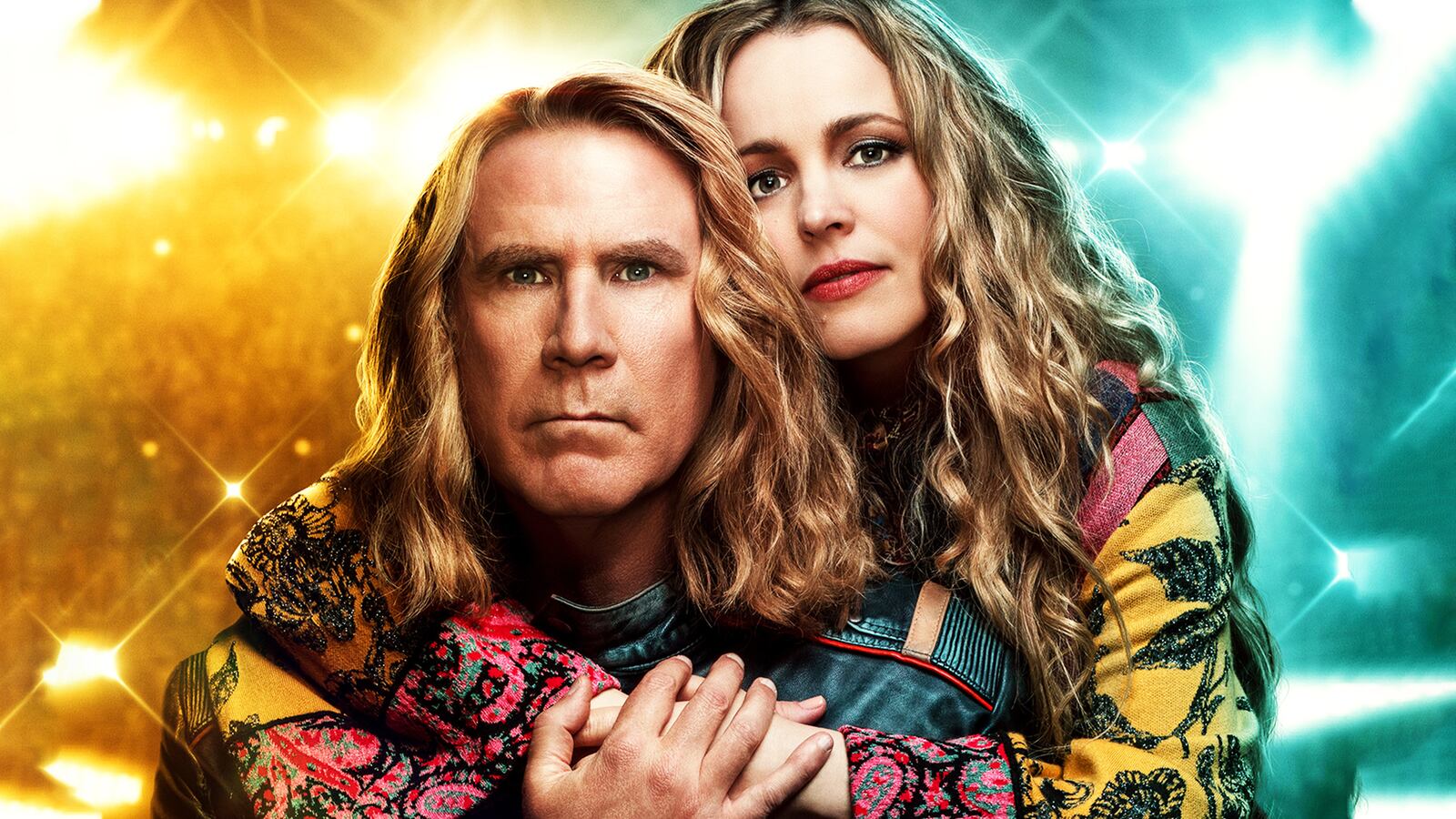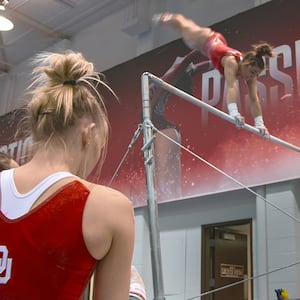Will Ferrell is the funniest comedic actor of the past 20 years, a master of buffoonish absurdity whose gift for juvenile nonsense—often laced with explosive aggression—has rightly made him a Hollywood A-lister. It therefore brings me no joy to report that his latest, Eurovision Song Contest: The Story of Fire Saga, is not only a two-hour slog of lavish production design and on-location filmmaking minus any trace of humor, but further confirmation that the star has gotten himself stuck in a rut of diminishing-returns repetition. What was once inspired for the Saturday Night Live veteran is now old hat, with Ferrell’s new Netflix feature (out June 26) stark evidence that he’s become comfortable regurgitating his trademark shtick—and, in the process, forgotten what made it work in the first place.
Eurovision Song Contest: The Story of Fire Saga concerns Lars (Ferrell) and Sigrit (Rachel McAdams), two clownish Icelandic pop-star wannabes whose lifelong dream is to win the international Eurovision song contest. Actually, it’s Lars’ dream, since regardless of her love of music, Sigrit is primarily in their duo (dubbed Fire Saga) because she loves Lars and pines to have a baby with him. That leaves the talented McAdams saddled with a mirthless secondary role as a character whose entire existence revolves around her male counterpart. Unfortunately, however, that’s the least of the problems for the film, which puts its considerable budget on-screen—via outrageous costumes and elaborate concert set pieces at the Eurovision competition—but can’t make time to concoct a single surprising or unique joke.
Director David Dobkin’s flat direction is partly responsible for the proceedings’ dreariness, but given that this is clearly a project built around Ferrell—who co-wrote the script with Andrew Steel—he invariably shoulders the brunt of the blame for Eurovision’s leadenness. Sporting long blonde hair, a weird Nordic accent and a variety of goofy tight-fitting and/or puffy outfits, Ferrell prances about like a stunted adolescent desperate for the global spotlight, all while rehearsing songs with McAdams in his basement (wearing a horned helmet and makeshift cape) and suffering scowls from his disapproving fisherman father Erick (Pierce Brosnan). He’s an overgrown teen still living at home, consumed with achieving a seemingly impossible goal, and possessed of an unreasonable and hardheaded belief in himself and his artistic abilities despite immense evidence to the contrary.
This is painfully familiar terrain for Ferrell, whose Lars is a demented kid who barrels forward no matter how often he publicly embarrasses himself. Worse, unlike Anchorman: The Legend of Ron Burgundy or Talladega Nights: The Ballad of Ricky Bobby, Eurovision doesn’t cast Lars as a reflection of a larger milieu that it’s also skewering. Ferrell and Steele’s’s script has no point of view on Lars, his home country, or the world of international pop music (and TV singing shows). Without any satiric perspective, it’s just a lot of bland immaturity stranded in a sea of expensive showstoppers that go on, and on, to no appreciably witty end. Devoid of distinctive characterization, Ferrell’s performance amounts to rote hijinks that aren’t nearly eccentric or outrageous enough to sustain the material. Compared to his magnum opus of dim-bulb man-child ridiculousness, 2008’s Step Brothers, everything here feels watered down and draggy.
Even The Other Guys, Ferrell and Mark Wahlberg’s undervalued 2010 cop comedy, had an angle on law-enforcement dynamics and corporate malfeasance, while also providing a fresh wrinkle on its star’s established big-screen persona. The thread linking that film, Anchorman, Talladega Nights and Step Brothers, of course, is Adam McKay, Ferrell’s long-time collaborator in inanity.
McKay’s absence from their partnership over the past few years (he was busy directing the Oscar-winning The Big Short and Vice) has resulted in a steep decline in the quality of Ferrell’s features. Since the pair’s last team-up, 2013’s Anchorman 2: The Legend Continues, Ferrell’s filmography is a collection of disappointing creative misfires: the gay panic-y Get Hard with Kevin Hart; the tepid The House with Amy Poehler; the disastrous Zoolander 2, with Ben Stiller and Owen Wilson; the redundant Daddy’s Home 2, with the repugnant Mel Gibson; the brutal Holmes & Watson, with John C. Reilly; and this past February’s limp Downhill with Julia Louis-Dreyfus.
As that recent resume makes clear, Ferrell continues to gravitate to strong co-stars. Yet none of those films was willing to embellish its formulaic narrative with the surrealist insanity that defines his best efforts. They’re safe in terms of plot, humor, and lead performance, which usually involves Ferrell doing an ever-more-minor variation on his typical protagonist. Whereas the actor has the range to color his infantile characters in varying shades of lunacy—sometimes angry beneath an adolescent exterior; other times arrogant or overly sensitive in addition to being babyish—he hasn’t done so memorably in years; now, one most often expects classic Ferrell craziness to materialize in cameos (such as his brief spot in Between Two Ferns: The Movie) rather than in headlining turns.
Ferrell remains one of the entertainment industry’s most accomplished off-the-cuff comedians, which is what makes a dud like Eurovision so disheartening. More than the endless procession of scenes and subplots that serve no purpose except to propel the paint-by-numbers story forward—mainly having to do with Dan Stevens’ one-note Russian adversary—it’s the lack of spontaneity that dooms this affair. It’s as if, having conceived the basic premise of playfully goofing on the European music world, Ferrell and company figured the majority of their work was done, and that they could otherwise simply gussy up the action with a modicum of halfhearted riffing and an avalanche of glitz and glamour—a frustrating impression that becomes more pronounced the longer one waits for a choice one-liner to break up the monotony.
The result is a film that not only fails on its own, but suggests that, for Ferrell, a real risk is in order, one that takes him out of his comfort zone and complicates, challenges or simply puts a novel spin on the routine he’s been mining for the past few decades. It’s clear he has that in him—and that it’s necessary, if he wants to maintain his spot at the apex of American cinematic comedy.


